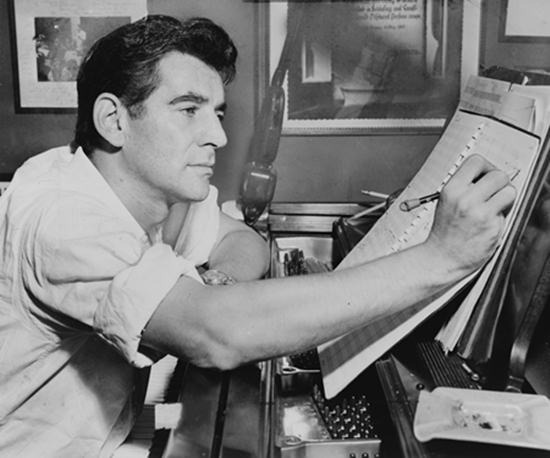
A hundred years ago on Sunday 25th August 1918, a boy was born to a Ukrainian-Jewish couple in Lawrence, Massachusetts. The child was to become a composer, conductor, author, music educator and pianist. At the peak of his career he was one of the most astonishing and dazzling personalities in the world of classical music. He was described by the music critic Donal Henahan of The New York Times as “one of the most prodigiously talented and successful musicians in American history.”
I am referring of course to Leonard Bernstein, who at birth was named Louis at the insistence of his grandmother. His parents had always called him Leonard and he legally changed his name during his teenage years. His grandmother didn’t object, partly because she had already died. To his many friends and colleagues, he was always known as “Lenny”.
Bernstein (BURN-styne) began piano tuition at an early age and in his late teens was accepted at Harvard University where he majored in music. He later attended the Curtis Institute of Music in Philadelphia and began conducting studies with Fritz Reiner. At the age of twenty-five, Bernstein was appointed assistant conductor to the New York Philharmonic. His lucky break came in November 1943. The guest conductor Bruno Walter suddenly contracted influenza before a Carnegie Hall concert. Bernstein was called in at short notice and without time for rehearsal conducted a challenging programme of music by Schumann, Miklós Rózsa, Wagner and Richard Strauss. At the end of the concert, which was broadcast nationally Bernstein received a standing ovation. His brilliant conducting career was launched.
His initial reputation as a conductor rested partly on his eleven-year stint with the New York Philharmonic. During his career he conducted some of the world’s leading orchestras, mostly frequently the Boston Symphony, the Israel Philharmonic, the Vienna Philharmonic, the London Symphony and the Orchestre National de France. There were many others. He returned to the New York Philharmonic almost every year and during the 1970s toured with them to Europe and Asia. Bernstein was a gifted teacher and had a passion for music education. His television lectures on classical music began in the 1950s and continued for the rest of his life.
Of course, Bernstein is also known as a successful composer with many works to his credit including three symphonies, a huge amount of music for orchestra along with music for film and theatre. He’s best known for his opera West Side Story, which was a re-working of the Romeo and Juliet theme but set in New York City. The song lyrics were written by 27-year-old Stephen Sondheim.
Bernstein conducted all the Mahler symphonies with the Vienna Philharmonic as well as the complete symphonies of Beethoven, Brahms and Schumann. This performance was filmed in 1978 and it’s preceded by a fascinating short talk by Bernstein himself. There are Japanese subtitles which you might find helpful and for reasons which are not entirely obvious, the title sequence is accompanied by the opening bars of the fifth symphony.
This work dates from the summer of 1806 and after the long and mysterious introduction it transforms into a sunny, light and cheerful work. In many ways, much of the music seems to look back to the previous century and recalls the symphonies of Haydn with whom Beethoven had studied ten years earlier. It’s probably the least known of the nine symphonies and rather overlooked because it stands between two other major and weighty works, the Third Symphony (known as the Eroica ) and the mighty Fifth Symphony with its iconic four-note opening theme.
The work has a remarkably beautiful slow movement which caused Hector Berlioz to remark that it was the work of the Archangel Michael. I’ll leave you to judge that for yourself, but Bernstein gives a compelling performance and brings out the lightness and grace of this most attractive work. The last movement is taken at a terrific pace and really sparkles with energy.
Bernstein’s fame as a conductor has overshadowed his skill as a remarkable pianist. He conducts the orchestra from the piano in this colourful work, which he had twice recorded a good many years earlier. So often this concerto played in a reserved French style; polite and demure. Not so with Lenny! Although some people might find his approach a bit brash, he brings another dimension to the work and emphasizes the colour, brilliance and excitement in the outer movements yet brings poignant depth and passionate intensity to the poetic slow movement. Yes, I know there are some minor flaws but as far as I’m concerned, this is a performance to treasure.
 |
 |
 |





